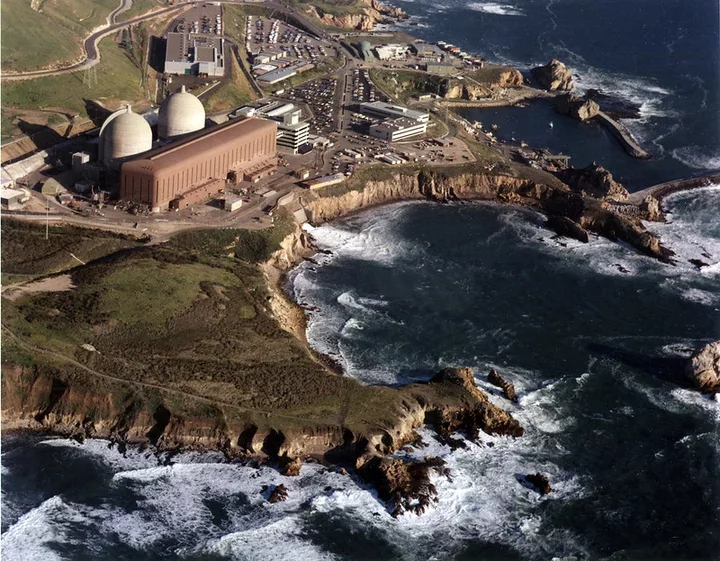The Diablo Canyon Nuclear Power Plant, in San Luis Obispo County, is the last remaining operational nuclear plant in California. | Image via the Nuclear Regulatory Commission, CC BY-NC-ND 2.0.
###
###
On Thursday afternoon, the board of directors for Redwood Coast Energy Authority (RCEA) will have the opportunity to take a do-over on its recent decision to decline an allocation of nuclear energy into the mix of power sources it purchases on behalf of local ratepayers.
Last month, a shorthanded board held a lengthy debate about the pros and cons of accepting a short-term cut of the power being generated by the Diablo Canyon Nuclear Power Plant near Morro Bay. This power would technically be “free” for the agency since all electricity users in California are already paying for it — plus, it would qualify as clean energy credits.
Through California’s Community Choice Aggregation program, RCEA functions as the default provider of electricity generation for the vast majority of consumers in Humboldt County. Since 2017, the agency has been purchasing electricity from a variety of mostly green, renewable sources and then re-selling that energy to its roughly 63,000 local customers (meaning households and businesses) at slightly lower rates than PG&E.
Diablo Canyon was supposed to be shut down by the end of next year, but with California’s renewable energy development lagging behind schedule, the state legislature approved a $1.4 billion loan to PG&E to keep it operating through 2030. As part of the deal to keep the plant operating, all jurisdictional entities under the California Public Utilities Commission (CPUC) are paying a share of the costs, and they all have the option of receiving an allocation of the power generated by Diablo Canyon.
But RCEA’s Energy Risk Management Policy bans long-term nuclear energy procurement, so the board would have to approve a short-term exception to that policy to accept the energy. Some board members last month suggested doing just that and using the money it saves to close the agency’s budget deficit, lower rates, pay for anti-nuclear advocacy and/or invest in more renewable energy projects.
Others advocated standing on principle, especially considering the challenges and risks associated with long-term storage of toxic nuclear waste, among other factors.
After more than an hour of discussion and public comment, the board narrowly rejected a motion to accept the nuclear credit. The vote was two “yes” votes to three “no” votes, with four board members absent.
So why the do-over? Well, the staff report for Thursday’s meeting explains that there was a “process error” last time around.
“The Board was mistakenly told that all five Community Choice Energy voting members present would need to vote affirmative for an action to pass,” the staff report says. “This information was in error, and this mistaken information could have influenced the vote.”
The actual voting requirements for decisions related to Community Choice Energy are a bit more complex because the representatives of some districts carry more weight than those of others, based on the following formula:
When it comes to decisions about Community Choice Energy, a motion passes only if and when it receives “yes” votes from a majority of the voting members present AND it gets support from more than 50 percent of the weighted votes present.
Like we said: complex. But given the large number of board member absences at the last meeting, along with the conflicted opinions expressed by those who were present, things could very well turn out differently this time around.
RCEA staff point out a several potential benefits to accepting the nuclear power, noting that “the price of required clean energy credits has increased significantly and building local renewable energy projects to meet state requirements has been very difficult and slow.”
They also point out that Diablo Canyon will not produce more energy just because RCEA and other community choice aggregators accept the credit. And it would be good for the agency financially. The staff report says, “RCEA could sell an equivalent amount of carbon-free hydropower for about $500,000 this year to counter a large, expected budget deficit.”
On the other hand, critics note that Diablo Canyon stores nuclear waste in a seismically active area, and some board members — including Eureka representative Scott Bauer — say that accepting nuclear energy runs contrary to RCEA’s mission and would make the agency complicit with environmental risks that last generations. It could also damage public perception, sending some customers back to PG&E, board members noted last month.
Thursday’s meeting will be held in the Bay Room, downstairs at the Wharfinger Building in Eureka. It’s scheduled to begin at 3:30 p.m.
To participate in the meeting online, click this link shortly beforehand.
To participate by phone, call (669) 900-6833 or (253) 215-8782 and enter webinar ID: 819 7236 8051.
Further instructions:
To make a comment during the public comment periods, raise your hand in the online Zoom webinar, or press star (*) 9 on your phone to raise your hand. You will continue to hear the meeting while you wait. When it is your turn to speak, a staff member will prompt you to unmute your phone or computer. You will have 3 minutes to speak.
You may submit written public comment by email to PublicComment@redwoodenergy.org. Please identify the agenda item number in the subject line. Comments will be included in the meeting record but not read aloud during the meeting.


CLICK TO MANAGE